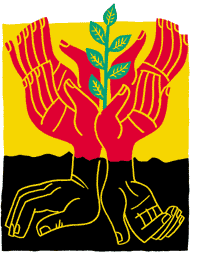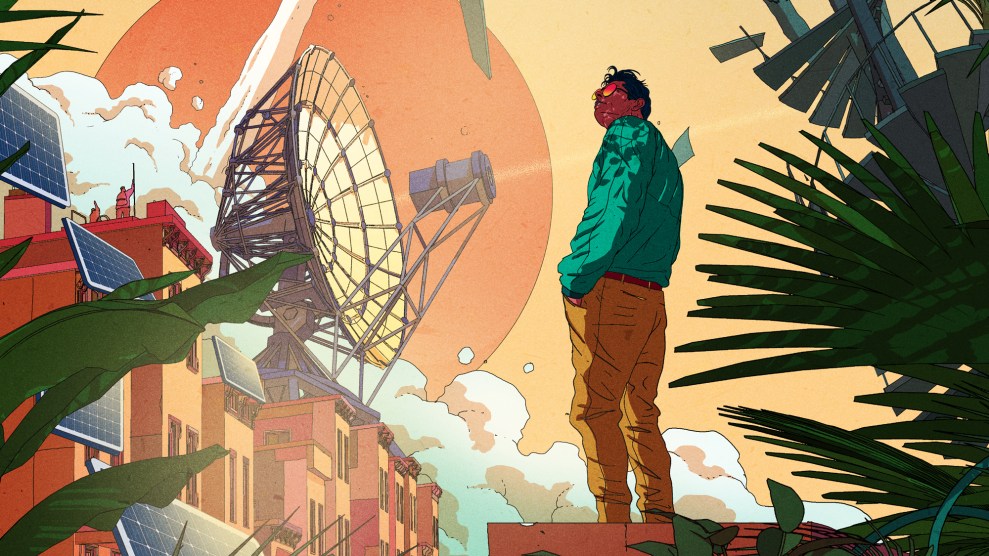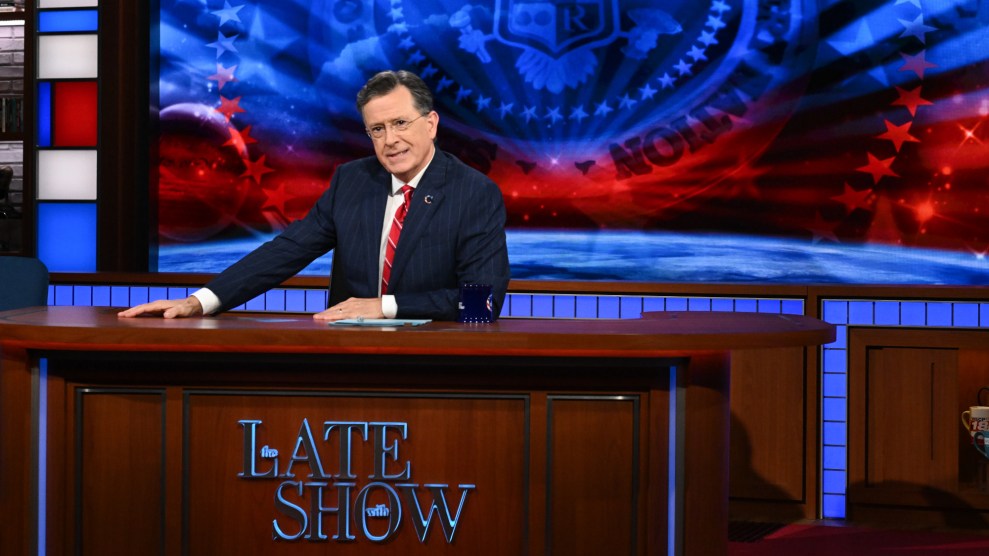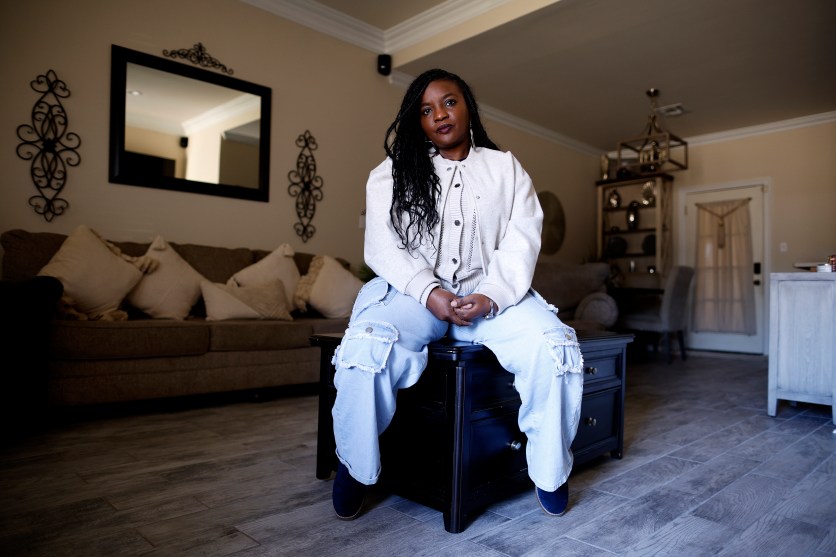
Illustration: Luba Lukova
Before Rita Lasar’s brother, Abe Zelmanowitz, died in the World Trade Center on September 11, Lasar would have been considered a pretty typical 70-year-old. A widow, retired from a small family electronics business, she traveled, and visited her granddaughter in New Jersey, and did some volunteer work in the public schools. But, truth be told, the volunteer work had tailed off.
It is nearly a year after her brother’s death when Lasar and I speak, sitting at the kitchen table in her airy 15th-floor apartment on New York’s Lower East Side, an apartment with a perfect, unobstructed view of the Empire State Building. (Unobstructed unless, like Rita Lasar, you drew the blinds for weeks on end because you were sure a plane was going to smash into it.) “Typical” is not how anyone would describe her now. “Dogged peace activist” is more like it. As the éminence grise of Peaceful Tomorrows, a group of people who lost family members on September 11 and do not want those losses to justify other deaths, Rita Lasar has found her life’s work. “I am totally dedicated, for the rest of my life, to the peace movement and to the people of Afghanistan,” she says unequivocally.
Unequivocal is another way to describe Rita Lasar; she does not do anything by half. When, three days after the attacks, President Bush mentioned her brother in his speech at the National Cathedral, Lasar — incensed that Abe’s death might be used to sanction a war in Afghanistan — dashed off an angry letter to the editor of the New York Times. The letter caught the attention of a small Chicago-based peace group called Voices in the Wilderness. They put Lasar’s letter on their Web site, where it was soon joined by letters and articles from other 9/11 family members voicing similar points of view.
Among those who found them there was David Potorti. A 46-year-old former television advertising producer in North Carolina, he had lost his brother Jim, who worked on the 95th floor of the Trade Center’s north tower. “[They were] all saying the same thing I was thinking,” he recalls. “We should seek justice, but shouldn’t do that by killing more innocent people.” When he learned that Voices in the Wilderness was sponsoring a peace walk from Washington, D.C., to New York in late November, he made contact with relatives of Craig Amundson, a 28-year-old Army multimedia specialist who had died at the Pentagon. Amundson’s family had been clear from the start that retaliation and vengeance would bring them no comfort; indeed, Craig’s widow, Amber, had written exactly that in a letter she hand-delivered to Colin Powell at a memorial service for her husband and his colleagues.
“The walk was one of those ‘I’ll go if you’ll go’
kinds of things,” Potorti
recalls. They went. And when the peace walk ended, in New York’s Union Square, they met up with
Colleen Kelly, whose brother Billy just happened to be at a conference at the top of the World Trade
Center on September 11, and who had written a letter to the nation’s Catholic bishops urging
them to help “find an alternative to the bombing.” By nightfall, in a bar in Greenwich
Village, they had decided to work together.
“When we spoke out [as a family], we were criticized and marginalized,”
says Kelly Campbell, Craig Amundson’s sister-in-law. “People would say, ‘Oh,
that’s the Amundson family—they’ve just lost their minds.’ It was so incredible
to speak to other people who were going through the same thing we were.” For Colleen Kelly,
a nurse-practitioner from the Bronx whose “Catholic Worker karma,” she says, was being
put to the test by the death of her brother, meeting the others brought a measure of rest. “I
no longer felt like I was crazy,” she says.
Their group, “September 11th Families for Peaceful Tomorrows,”
was officially launched in New York two months later. Its agenda was as straightforward as it was
fuzzy: to work for peace; to seek nonviolent responses to terrorism; to reach out to people in other
parts of the world whose lives had been upended, too, by violence. What that has meant, in practice,
has been talking—to peace groups and church groups and college groups; appearing on television
shows like Oprah and Donahue; being the dissenting voice on talk radio; making connections with
other peace groups, here and abroad.
As the group began to coalesce and gain members—it is now about
40 strong—Colleen Kelly quit her nursing job to devote herself to Peaceful Tomorrows full
time. In San Francisco, Kelly Campbell resigned from her environmental advocacy job to do the same.
In North Carolina, David Potorti dropped out of graduate school to become the group’s East
Coast coordinator. Potorti, his wife, and their child have spent the better part of a year living
off their credit cards. A few grants have come in, and there have been honoraria and offerings at
churches here and there, but for the most part, Potorti says, they are all “living on goodwill.”
A lot of that goodwill comes from being a part of the group itself. “It
is the one good thing that has happened this year,” Rita Lasar says. “The bond was immediate—
David, Kelly, Colleen, all of them. Except for my children, they are my family now. If I haven’t
seen one of them for a while and they come into view, it’s love.”
In many ways, it is love, not politics, that motivates the group. Love, certainly,
for the brothers, sisters, husbands, wives, children who perished, and whose memories they hope
to honor by participating in Peaceful Tomorrows, even if they’ll never know if those children,
those spouses, would approve of their work. But love, too, as a force in the world, as an example,
as a point of view. “My response went deeper than a political reaction,” says Eva Rupp,
whose 20-year-old stepsister, Deora Bodley, was on Flight 93. “For me, the best reaction
was to find love for the groups that I fear.”
This past January, Rupp and her stepfather, along with Kelly Campbell
and Rita Lasar, traveled to Afghanistan as part of a trip sponsored by the Third World advocacy group
Global Exchange. Near Kabul they saw fields ripe with land mines, and children who had been rendered
mute by fear. They accepted thanks for the United States’ role in destroying the Taliban,
but tried to make clear that not everyone in the United States supported the war effort. They were
consoled by people who had lost relatives to American bombs—sometimes the same people who
thanked them for destroying the Taliban—and tried, in their own way, to offer solace. Returning
to this country, they lobbied in Washington on behalf of those other victims of September 11, urging
Congress to pay reparations to people harmed by American bombs.
“We were in a church in Worcester, Massachusetts, this winter
trying to raise money for the people in Afghanistan, and a lot of homeless people came because it
was so cold out,” says Eva Rupp. “When it was all over, the homeless people dug into their
pockets and gave us what they had. They could identify with that desperateness.
“Unlike the homeless people of Worcester,” she goes on,
“Congress doesn’t feel the
For Colleen Kelly, meeting other September
11 family members who shared her views brought a measure of rest. “I no longer felt like
I was crazy,” she says.
need to act very quickly.” Only 40 members
of the House of Representatives have agreed to push for an Afghan Victims Fund in next year’s
budget.
In the room that is now her office, the one with a phone that has speed-dial
for Kelly, Colleen, David, Amber, Eva, and the other people who catapulted into her life after September
11, Rita Lasar shows me pictures of her trip to Afghanistan. There is one of elementary students
learning to identify cluster bombs, one of a de-mining operation to remove explosives left by 20
years of war, others of children swaddled in bandages that cover their maimed hands, their missing
feet. “You can’t imagine,” she says.
It is almost time for her to take me across town, to visit the World Trade
Center site, an-other unimaginable thing. So much this year, she suggests, has been like that—unbelievable,
unlikely, inexplicable. We hail a cab and ask to be taken to the corner of Broadway and Liberty Street.
“This is where it gets heartbreaking,” she says when the taxi crosses some invisible
line below Canal Street.
We don’t go to the site itself, but to a nearby office building where
the city has set up a viewing room for family members on the 20th floor. In a way, it is like what happens
at a funeral home when relatives and friends come to say goodbye. Only here the casket is acres wide
and miles long. We look down into the hole where the towers used to be and Lasar asks me what I see. “Nothing,”
I say. Lasar tells me that her brother’s company name tag was recovered recently from the Fresh
Kills landfill, but his body has not been found.
And what of that brother, an Orthodox Jew who worked as a computer programmer
at Blue Cross Blue Shield? What would he make of his sister, traveling the world in his memory, but
not to avenge his death? “I want to believe that he would not want people to die because of him,”
she says, choosing her words carefully, because she just doesn’t know. In a few days she’ll
be in Baltimore, addressing a convention of 10,000 Muslims. In a few weeks she’ll represent
Peaceful Tomorrows at a conference in Hiroshima. After that, there’s the anniversary of
September 11, and all that it will bring.
We part on Liberty Street. I watch Lasar walk away from the place where
her brother died and disappear into the crowd. But that is an illusion. She is not walking away from
anything. She is not disappearing.
















